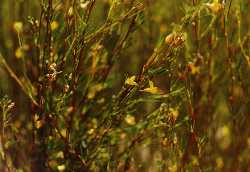|
Industry Event!
As part of its Intra-African Trade Promotion Programme, the
International Trade Center is hosting a Buyers/Sellers Meeting
on Exotic Food and Beverages November 28 and 29 in Johannesburg.
To find out more, visit the Events
section on the A-SNAPP website.
Bringing
South Africa's Favorite Drink to the World Market
Rooibos tea (Aspalathus linearis) - cherished for its mahogany
color, deep aroma, full-bodied taste, and health benefits -
is the most  popular
drink in South Africa. It is enjoyed hot or iced, with milk
or without, even baked into sweets. Now people overseas are
becoming interested in this "red bush" tea - the Expert Control
Board reports that 2,000 metric tons of rooibos were exported
in 1999. popular
drink in South Africa. It is enjoyed hot or iced, with milk
or without, even baked into sweets. Now people overseas are
becoming interested in this "red bush" tea - the Expert Control
Board reports that 2,000 metric tons of rooibos were exported
in 1999.
A-SNAPP's Unique Role
As rooibos grows in international popularity, A-SNAPP is helping
South African small farmers make the transition from wild harvesting
to sustainable cultivation of a product suitable for export
to the world market. Seventy-five farmers from Wupperthal and
surrounding communities currently participate in the program,
many of whom used to gather rooibos in the wild.
By working with A-SNAPP, farmers have improved access to the
resources, technology, expertise, buyer contacts, and market
information they need to compete successfully in a global market.
A-SNAPP partners are helping them standardize the processing,
marketing, and quality control of rooibos to meet the expectations
of foreign buyers. And because they have an overview of all
the steps in the production and exportation process, A-SNAPP
partners are able to coordinate logistics between different
parts of the rooibos supply chain.
A-SNAPP in Action
A-SNAPP partners began the rooibos project by researching the
level of market demand and assessing the feasibility of sustainable
commercial cultivation. One of the most important things they
learned was that growing rooibos organically is not particularly
difficult and would bring farmers a better price. As a result,
all Wupperthal farmers are now growing rooibos organically.
A-SNAPP also hosted Participatory Rural Appraisals in Wupperthal,
Eselbank, and Heuningvlei to find out how the program could
best help rooibos farmers. Many were having difficulty gaining
access to farm land from local authorities, so A-SNAPP partners
stepped in as their ombudsmen.
Participants also identified problems with infrastructure (facilities,
transportation, machines, etc.) as a key issue. The present
shortage of processing facilities provides a good example. Half
of the rooibos harvested by A-SNAPP farmers - 150 metric tons
- must be trucked more than 100 km along poor roads for processing
because local facilities are inadequate. The cost of transportation
and the lower market price paid for rooibos outside the area
reduce a farmer's profits considerably. A-SNAPP partners have
worked to address these types of problems by upgrading existing
packing, processing, storage, and growing facilities.
One of the goals of A-SNAPP is to create self-sustaining projects.
This means that, eventually, adequate funding and infrastructure
must be in place so that A-SNAPP's assistance will no longer
be needed. To achieve this goal, A-SNAPP partners connect producers
with buyers, provide guidance on export regulations, and attest
to the project's social and environmental sustainability. These
actions and the dedication of A-SNAPP farmers encourage investment
from local and regional government, private industry, herb exporters,
and other non-government organizations.
Continued
on Next
Page
|